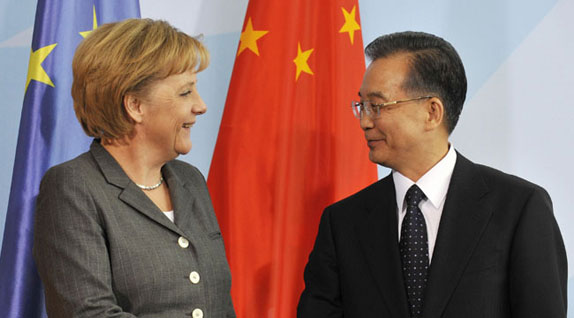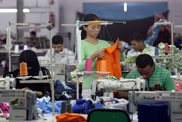 John MacDougall/AFP/Getty Images
John MacDougall/AFP/Getty Images
Article
As China comes into its own—with its ties to the United States and Europe loosening—what does history reveal about this rising Asian dragon?
Learn the why behind the headlines.
Subscribe to the Real Truth for FREE news and analysis.
Subscribe NowThrough millennia of recorded history, the people of China have enjoyed a civilization rich in tradition, culture and art. Today, one in five people on Earth lives in China.
The nation remained a mystery to most Westerners up to the latter half of the 20th century. United States President Richard Nixon’s trip there in 1972 ended 25 years of isolation between the U.S. and the People’s Republic of China, resulting in the establishment of diplomatic relations between the two countries in 1979.
It was not until 1994, when the official control of money exchange was abolished, that China began to vigorously develop, becoming part of the global economy.
But it was the 2008 Summer Olympic Games that introduced modern China to the world. Through the Internet and worldwide television coverage of the spectacular opening and closing ceremonies, the people and nation of China boldly demonstrated they had entered the 21st century.
At the same time, the publicity surrounding the games shed light on China’s limits and challenges.
Most recent governments in China have been working with the United States and the European Union in the areas of economic development, climate concerns and terrorism as a cooperating partner. China is a full member of the United Nations Security Council and joins with the West in striving to achieve world peace. However, age-long feelings of superiority run deep in the minds of Chinese leaders whose predecessors once enjoyed independent prominence and view reliance on the West as a temporary necessity.
As it hints at breaking free from foreign ties, China is poised to once again stand on its own as a world power.
Historic Disdain
In a 2008 essay published in Foreign Affairs, Kishore Mahbubani writes, “The United States is currently the only country with the capacity and the ambition to exercise global primacy and it will remain so for a long time to come. This means that the United States is the country that can exert the greatest strategic pressure on China. Although in recent years Beijing has refrained from identifying Washington as an adversary or criticizing its ‘hegemonism’—a pejorative Chinese code word for U.S. dominance—many Chinese still view the United States as a major threat to their nation’s security and domestic stability.”
In reality, the emotion runs more deeply. Many Chinese hold a condescending view of Americans and Europeans. They do not believe that long-term strength is built through the rule of the people, but rather are convinced that it is just a matter of time before the democracies of the U.S. and Western Europe fall. This evaluation of the West is not a new feeling in China, but is deeply felt, and was manifested in the way the Chinese treated arriving merchants from the West.
The first to land in China were the Portuguese, establishing a foothold at Macau, from which they monopolized foreign trade at the Chinese port of Guangzhou (Canton). Soon the Spanish arrived, followed by the British and the French.
Trade between China and the West was carried on under the guise of tribute: foreigners were obliged to follow elaborate, centuries-old rituals imposed on envoys from China’s tributary states. The imperial court did not entertain the possibility that the Europeans would expect or deserve to be treated as cultural or political equals. The sole exception was Russia, China’s most powerful inland neighbor (with whom China still enjoys close ties today).
In an article, “China’s Growing Sea Trade with Europe 1517-1800,” essayist James Graham states, “The Europeans constantly faced different rules and higher costs in their trade with China than did China’s traditional tributary states. Excluding precious metals there was little desire in China for anything the Europeans had to trade. This position of relative strength allowed China to draw the Europeans into its world order largely on Chinese terms…China relied on its tribute system to subordinate non-Chinese to the Emperor and thus maintain its perception of a world dominated by Chinese civilization.”
Strained Ties
For the time being, because the United States is a global leader in economics, education, culture, technology and science, China must subdue its view of the West and maintain a close relationship with both the Americans and the European Union if its modernization efforts are to succeed.
China depends on the U.S. to export its goods, while the U.S. relies on China to buy up its rapidly ballooning debt. China holds more than $801 billion in U.S. Treasury debt, the largest foreign holding of any country. In addition, the amount of trade between the two nations soared from $5 billion in 1980 to $387 billion in 2007.
“Shortly after [President George W. Bush] was sworn in, China and the United States confronted each other over one of the severest challenges posed by the collision of a Chinese jet plane with an intruding US spy aircraft over the South China Sea in April 2001. With cool-headedness and reason, the two countries managed to keep the event’s impact on bilateral ties to a minimum” (China Daily).
But recent events have strained their relationship, as reported by The Associated Press.
“Beijing was incensed by Washington’s January announcement of a $6.4 billion weapons package for Taiwan, the self-governing island it considers Chinese territory. Beijing suspended military exchanges and has threatened to retaliate against U.S. aerospace firms involved in the deal.”
The Chinese government has also voiced disagreement regarding Washington’s position on the Iranian nuclear program.
“China may want to avoid any damage to its burgeoning economic relationship with Iran, an important source of energy for the booming Chinese economy. Beijing shares relatively few of Washington’s concerns in the Middle East beyond energy security, and the recent bilateral tensions may have made the leadership even less inclined to cooperate with the U.S. push for sanctions.
“The new tensions join recurring friction over human rights and commerce, with U.S. critics accusing China of deliberately undervaluing its currency to boost its massive trade surplus. Meanwhile, Beijing last month charged Washington with abusing trade relief measures after U.S. regulators increased import duties on Chinese-made steel pipes” (ibid.).
The February meeting between the Dalai Lama and U.S. President Barack Obama also fueled friction.
“China accuses the Dalai Lama of heading separatist forces—he says he seeks only meaningful autonomy—and has taken a tough line on his meetings with heads of state, particularly since his high-profile 2007 visit to the US. In 2008 [China] cancelled an EU summit after learning that French president Nicolas Sarkozy was to meet him” (The Guardian).
And given that the U.S. imports more than China exports, there is now a $250 billion trade deficit, which has put the U.S. in a compromised financial position.
Separate Track
A Washington Post article titled, “China’s strident tone raises concerns among Western governments, analysts,” detailed China’s rising sense of itself.
 Khaled Desouki/AFP/Getty Images
Khaled Desouki/AFP/Getty Images“From the Copenhagen climate change conference to Internet freedom to China’s border with India, China observers have noticed a tough tone emanating from its government, its representatives and influential analysts from its state-funded think tanks.”
“‘There has been a change in China’s attitude,’ said Kenneth G. Lieberthal, a former senior National Security Council official who is currently at the Brookings Institution. ‘The Chinese find with startling speed that people have come to view them as a major global player. And that has fed a sense of confidence.’”
China has been gaining influence not only on the world scene, but also among Asian countries, as it has been viewed as helping to bring unity to the area.
“A free-trade agreement between China and Southeast Asia came into force [in January 2010], consolidating a sixfold surge in economic activity over the past decade between countries representing a quarter of the world’s population.
“The agreement expands a limited 2005 trade area between China and the 10-member Association of Southeast Asian Nations, scrapping tariffs on about 90 percent of goods” (Jakarta Globe).
While the U.S. and Europe attempt to avoid increased tensions with Asian nuclear powers, particularly Iran, China watches these nations with other motives.
As the West calls for stiffer sanctions on the Iranian Republic, Beijing has repeatedly acted alone, opposing most any action against the nuclear ambitions of the nation, which supplies more than 15 percent of China’s oil.
Also, China has eclipsed global export leaders. Last year, the nation edged ahead of Germany as the world’s largest exporter. “Total 2009 exports were more than $1.2 trillion…ahead of the 816 billion euros ($1.17 trillion) forecast for Germany…” (AP). Low-cost manufacturing, a huge labor force and purchasing power has helped catapult China into rapid economic growth. Chinese auto sales surpassed United States’ totals in 2009.
While China’s motives may seem unclear to the West, history reveals the answer. In the past, China called the shots for its international dealings and desires to do so again.
Just as history demonstrates China’s unending quest for power, Bible prophecy—more simply, history written in advance—shows the future of this rising powerhouse, which will one day rival a soon-to-come European superpower. Prophecy indicates that China, along with longtime ally Russia and other nations, will help organize an army that will march into the final culmination of a Middle East crisis (Rev. 9:16).
As it shoots to prominence on the world stage, China seems capable of charting its own course—regardless of popular opinion. Similar to the past, China appears to be awakening to the reality that it can once again operate freely, under its own terms.
To understand China’s role in future conflicts, read our article “What Is Armageddon?”
- Real Truth Magazine Articles
- RELIGION


